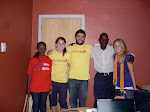So it’s almost the end of week number three in Malawi and I think I’m finally starting to develop some semblance of a routine here. As you can probably imagine, it took me a little while to adjust to everything out here but now that I know a little bit about my surroundings I’m feeling great. Every day I eat at this delicious little tin shack called “Chez Sharif’s” which is run by the eccentric Indian/Malawian man and his wife. I’ve had lunch here every day since I’ve been here, a meal is approximately one dollar and it consists of a full chicken breast, a huge portion of rice, some salad, some cabbage, some green beans and a piece of Chapati (which is like Kenya’s form of Naan bread). Pretty good deal if you ask me. Of course you got the occasional pebble in your plate but this minor inconvenience is more than compensated for by the quality of the food and the price. I’m going to take a picture of Sharif and his wife soon and post it here so that you guys can meet him; he is one of a kind. My name around here is now “two thumbs up” because after my first meal at his restaurant he asked me how it was and I said “two thumbs up”. He had never heard the expression, and now he loves it. He calls me “two thumbs up” at least three or four times each meal.
I heard a lot about Baylor’s dependence on door-to-door testing before I got here so it was a real honor to be given the opportunity to participate. Apparently many people in the HIV field have hailed Baylor in Malawi for its door-to-door innovation – and now I can see why. It’s amazing because it reaches out to a percentage of the community that may never have tested otherwise. Many people cannot go to local clinics to get tested for a number of reasons: 1) they can’t afford transport. 2) they just aren’t aware that testing is available and free. 3) they are worried about the potential stigma if they are seen going to the HIV clinic to get tested. By going to people’s houses within the community, we are really targeting a group that may never have been tested otherwise – which you have to admit is probably one of the biggest aims that HIV testing has in Africa. All in all the whole experience was incredible for me, and I was happy to hear that being white and being in attendance may have actually helped the testing. At the first house we went to, we were supposed to test one GRS participant, a 12-year-old boy named Victor. After going to visit his house, and being introduced to the whole household and the neighbors and their neighbors we managed to convince 15 people to get tested. The whole thing took a long time but in the end it was worth it, because 15 more people got tested.
The one thing that really stood out for me as I went home after the event was the lack of male participation in the event. All 15 people that we tested were either females or little boys. We saw three men in the house and all three declined to get tested for whatever reason – which is kind of troubling. In training we learned all about “multiple concurrent partners” which is said to be one of the biggest contributing factors to the spread of HIV in sub-Saharan Africa. This is when young men and women decide to engage in multiple sexual relationships at the same time. As you can probably guess, in a conservative culture like the one in Malawi the vast majority of the time it is the male who decides to have multiple partners at once. While Rachel and I were sitting in Victor’s house, I kept thinking about how important it was for the men to test. Obviously I was happy to see all 15 women and children turn out negative tests, but I was also frustrated because I knew that all this meant nothing if the husband decided to get another girlfriend who was HIV+. If this happens, he would then potentially infect his wife, any newborn children, and maybe even anyone else in the household. After this experience, Rachel and I decided to think of ideas to get men more involved in our program so this is one of our major projects now.
Alright, I’m going to sign off now but I’ll try to write again this weekend. I’m working at my first general testing event on Saturday from 8 am until whatever time in the afternoon. There is going to be soccer, music and fun times all around. We managed to convince a player from the Malawian professional soccer league to attend so the children should be excited. I’ll take pictures.


No comments:
Post a Comment